 Petzlover
Petzlover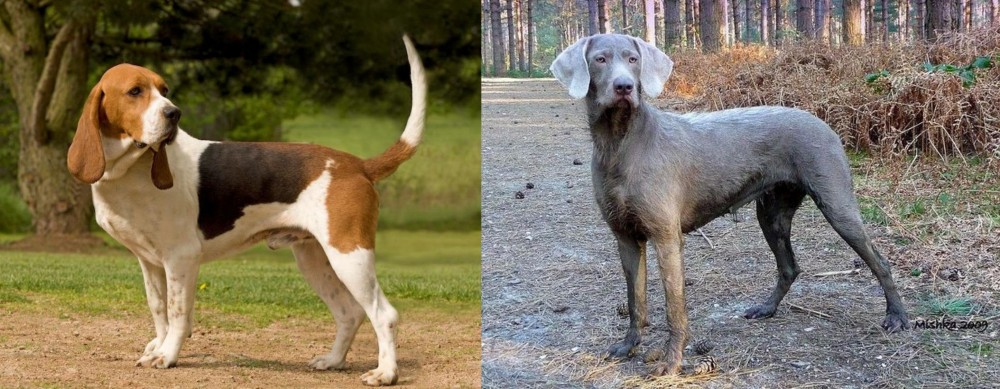 Artois Hound is originated from France but Slovensky Hrubosrsty Stavac is originated from Slovakia. Artois Hound may grow 9 cm / 3 inches shorter than Slovensky Hrubosrsty Stavac. Both Artois Hound and Slovensky Hrubosrsty Stavac are having almost same weight. Both Artois Hound and Slovensky Hrubosrsty Stavac has almost same life span. Artois Hound may have more litter size than Slovensky Hrubosrsty Stavac. Both Artois Hound and Slovensky Hrubosrsty Stavac requires Low Maintenance.
Artois Hound is originated from France but Slovensky Hrubosrsty Stavac is originated from Slovakia. Artois Hound may grow 9 cm / 3 inches shorter than Slovensky Hrubosrsty Stavac. Both Artois Hound and Slovensky Hrubosrsty Stavac are having almost same weight. Both Artois Hound and Slovensky Hrubosrsty Stavac has almost same life span. Artois Hound may have more litter size than Slovensky Hrubosrsty Stavac. Both Artois Hound and Slovensky Hrubosrsty Stavac requires Low Maintenance.
 The Artois Hound developed in France, essentially from the Picardy and Artois regions of northern France. The idea was to use them for the hunting of hares, fox and wild boars during the time of King Henry IV and Louis XIII. Unfortunately, with cross-breeding, the bloodline all but deteriorated and it took a couple of decades for the Artois breed to be restored.
The Artois Hound developed in France, essentially from the Picardy and Artois regions of northern France. The idea was to use them for the hunting of hares, fox and wild boars during the time of King Henry IV and Louis XIII. Unfortunately, with cross-breeding, the bloodline all but deteriorated and it took a couple of decades for the Artois breed to be restored.
After the 2nd world war, there was once again concern about the breed becoming extinct. A certain Mr.Audréchy from northern France stepped in and the breed was built up again. Today this hunting dog is essentially found in France, and a few hundred of them are registered with the Federation Cynologique Internationale (FCI), and both the FCI and the United Kennel Club (UKC) recognize the Artois Hound.
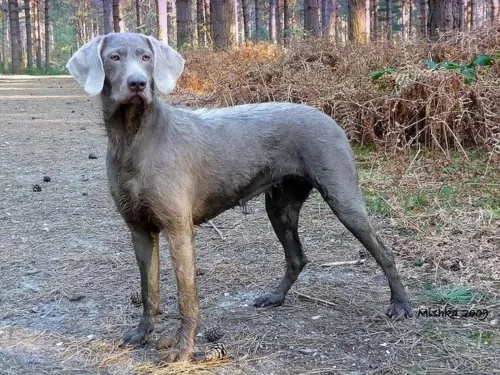 Breeding of the Slovak Hruborsty Stavac, fondly referred to as the SHS began around the 1940s.
Breeding of the Slovak Hruborsty Stavac, fondly referred to as the SHS began around the 1940s.
There were some dog lovers who were interested in crossing the coarse haired dogs of Slovakia with the German Wirehaired, the Czech blower and the Weimaraner. The outcome was a rough-haired kind of Weimaraner-looking dog.
While hunters and hunting were quite common in Slovakia, the breed became rather rare with the wars when hunting became less, but the dog was reconstructed by breeders, but is still rare outside Slovakia.
 Looking much like the Basset Hound and also referred to as French Artois Hound, Picard or Briquet, the muscled Artois Hound is a descendant of the Bloodhound and a rare breed.
Looking much like the Basset Hound and also referred to as French Artois Hound, Picard or Briquet, the muscled Artois Hound is a descendant of the Bloodhound and a rare breed.
The dog is well built with a large head, large eyes and large, hanging ears. He has a short coat, with the main colours being white, tan and black.
The energetic Artois Hound is a medium-to-large sized dog breed, and by FCI standard, they should be 20 inches to 22 3/4 inches tall from ground to withers.They weigh between 25 – 30kg or 55 and 65 pounds, are well muscled and strong with a short, dense coat.
These dogs are known for their endurance, making them ideal as a hunting- or walking companion. The Artois Hound is full of energy and he will require plenty of boisterous activities as well as training and socialization.
Although this is an intelligent breed, he can be stubborn. He’s a friendly character and will get on well with children, loving their energy and games. He’s amicable, and will also get on with other pets in the home too.
Artois Hounds are loyal to their human families. They’re not particularly good watchdogs though as they aren’t aggressive dogs, being social and friendly.
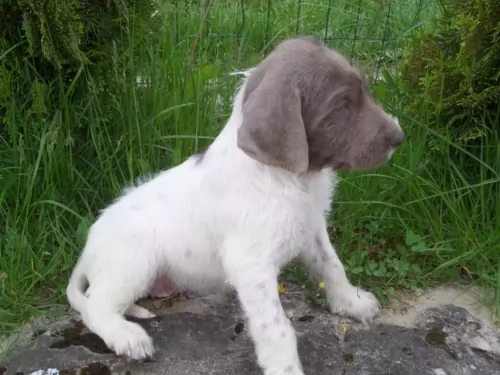 The dog is fairly large, standing at between 62 and 68cm in height and weighs 25 - 35kg. The coat is fairly coarse and dense and is a grey/silver shade with a touch of brown.
The dog is fairly large, standing at between 62 and 68cm in height and weighs 25 - 35kg. The coat is fairly coarse and dense and is a grey/silver shade with a touch of brown.
There is quite a bit of hair around the face. The ears are medium length and floppy and the tail is mostly docked to half its length but can be left long as well. The tail is set high and carried vertically and can be well feathered. The eyes are almond-shaped, and the dog has an intelligent appearance to him.
The Slovensky Hruborsty Stavac is a sharp dog, making it easy to have him trained and socialized. He is such a friendly, social dog, getting on well with all family members and loving to get involved with the games of the children.
There is no aggression in this dog and when you provide him with the exercise that he craves, he is loyal, gentle and loving, getting on well with other dogs as well.
 Your Artois is an ideal family pet when you provide him with the love and attention that any member of a family deserves. Buy your Artois from a reputable breeder so that all the excellent characteristics of this lively breed are found in your 4-legged friend.
Your Artois is an ideal family pet when you provide him with the love and attention that any member of a family deserves. Buy your Artois from a reputable breeder so that all the excellent characteristics of this lively breed are found in your 4-legged friend.
The Artois is just waiting to be your devoted companion and will promise unconditional friendship in exchange for quality food, veterinary care, exercise and attention. To make sure you never lose your pet, outfit him with a collar and ID tag so that should he become lost, the chances are far better that he’ll be found.
A dog isn’t a human and you want to always make sure that you’re reasonable with what to expect from him. Most little problems with your wonderful friend can be solved with kindness, compassion and patience.
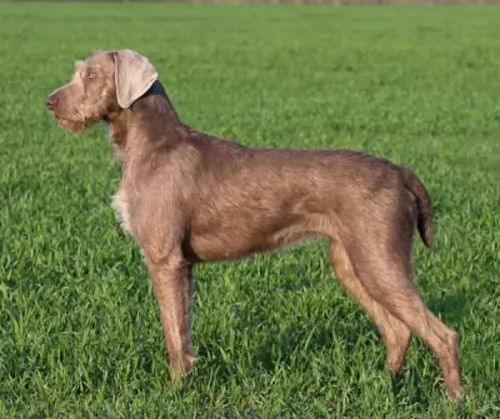 The Slovensky Hruborsty Stavac is such a bouncy, amicable pet, full of energy. He may appear to be confident and full of the joys but he secretly can’t stand it when his human family don’t include him in everything. He can actually suffer with separation anxiety.
The Slovensky Hruborsty Stavac is such a bouncy, amicable pet, full of energy. He may appear to be confident and full of the joys but he secretly can’t stand it when his human family don’t include him in everything. He can actually suffer with separation anxiety.
He is an athletic dog and will require lots of exercise – walks, hikes, ball games and running off his leash.
He is quiet but strong-willed and will respond well to a strong, firm, consistent, kind owner.
These dogs make the most awesome pets and you can either find one from a rescue group or find a puppy from a reputable breeder. Whatever you decide on, the Slovensky Hruborsty Stavac makes an extraordinary pet.
 There are no known health problems that come as specific to the Artois Hound. The health problems that do develop are common ailments that can be found in most other dog breeds too.
There are no known health problems that come as specific to the Artois Hound. The health problems that do develop are common ailments that can be found in most other dog breeds too.
Your Artois Hound will still need to visit the vet as a puppy for a thorough check-up as well as vaccinations and for any health issues he may have.
check for bad breath problems. Dental plaque can cause a nasty odour that will require dental treatment from a professional. The dog’s teeth can be maintained by brushing the teeth regularly with special canine toothpaste- and brush. However your dog’s bad breath could be indicative of other health problems such as diabetes.
Parasites, fleas, ticks and worms – there are many new treatments to manage these pests and your veterinarian will guide you towards a treatment for your pet.
if your pet is exposed to mosquitoes often, the insect carries the worm from dog to dog. Speak to your vet about treatment, more so when you live in a warm, wet area where mosquitoes thrive.
Your Artois Hound puppy will have to be vaccinated with a combo vaccine to protect him from hepatitis, distemper, leptospirosis, parvovirus and parainfluenza. They should have received their first immunizations by 8 weeks of age. Speak to your vet about rabies shots as well.
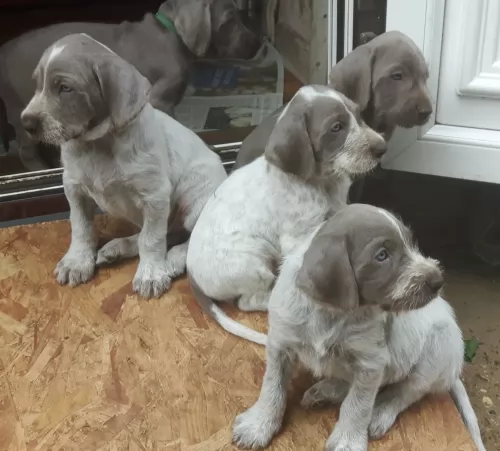 There are always some illnesses that your dog might get but which isn’t likely with your pet as these are healthy dogs.
There are always some illnesses that your dog might get but which isn’t likely with your pet as these are healthy dogs.
Dogs can die within a few hours if not treated with this ailment. Bloat is a condition where the stomach twists and fills with gas. The stomach is swollen and the gas can cause breathing problems because it puts pressure on the diaphragm. If you suspect that your dog has bloat, he should be rushed to the vet as soon as possible.
 The beauty with the Artois Hound is that he is low-maintenance and he will only require the basic tender loving care to keep him happy and healthy.
The beauty with the Artois Hound is that he is low-maintenance and he will only require the basic tender loving care to keep him happy and healthy.
The Artois isn’t a high maintenance dog and the low-shedding, short-haired coat will required a good brush a couple of times a week to remove loose hairs. The dog only requires a bath when absolutely necessary as bathing dries out natural oils in the skin. Never use a human shampoo – only a proper dog shampoo.
Artois Hound puppies up to 12 weeks will need to be fed every 6 hours. Puppies of 6 months and older can have 2 bowls of food, and from one year of age, one bowl of food may be adequate. It’s an individual choice as 2 smaller meals a day can also suffice. Speak to your vet about premium-quality dry- and wet foods as well as about making your own dog food. You want to ensure the foods eliminate mineral and vitamin deficiencies. Ensure there is ALWAYS a bowl of fresh, cool water within your dog’s reach.
This is a hunting dog so he will need plenty of exercise. Without regular exercise, a dog like the Artois becomes frustrated and destructive. Your Artois is your 4-legged family member, and according to age and individual traits will benefit from throwing ball games, pulling on ropes and running while you cycle. The cherry on the top is that you benefit from the exercise too!
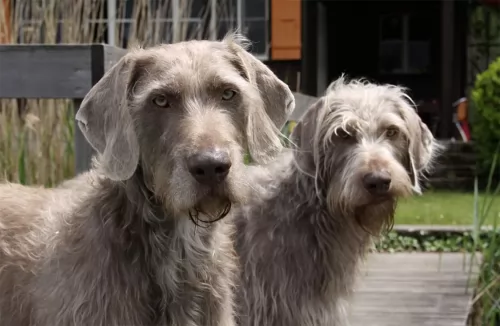 Before you bring your pet home, dog-proof your house. It won’t be fair to leave tempting, chewy things lying around and expect your pet to not be interested in them. Also, keep dangerous chemicals out of reach of your pet.
Before you bring your pet home, dog-proof your house. It won’t be fair to leave tempting, chewy things lying around and expect your pet to not be interested in them. Also, keep dangerous chemicals out of reach of your pet.
Prepare for your pet beforehand and have feeding- and water bowls ready as well as a nice basket or some other sleeping equipment available for him.
If you’re bringing an adult rescue dog home, try to feed him the same kind of food he was already eating, as too many changes can upset him. When he settles down, you can move over to other food. Keeping his food consistent can avoid digestive problems.
If you opt to feed him one of the commercially manufactured dog foods, make sure its the best quality as some of them are bad, filled with things such as colorants, preservatives and fillers. Try and give him some homemade food which you can add into the dry kibble twice a week. Boiled chicken, brown rice or pasta and spinach, sweet potatoes and carrots all boiled slowly together will delight your pet. Chop it all up and your pet will look so forward to this. Dogs thrive on simple, consistent meals like this. Provide water at all times.
The amount of exercise any dog needs is dependent on age, size and energy levels. Because the Slovensky Hruborsty Stavac is an energetic breed, he will need a good dose of exercise. If you have a puppy, avoid strenuous exercise as this can damage the soft, developing bones and joints. As well as walks and ball games, mental stimulation is also important for this dog. Consider buying some puzzle toys or feeders for your pet.
Keep up to date with all your dog’s immunizations and get your pet to the vet as soon as he is sick. There are some illnesses such as bloat which can claim your pet’s life in just a few hours if not attended to.